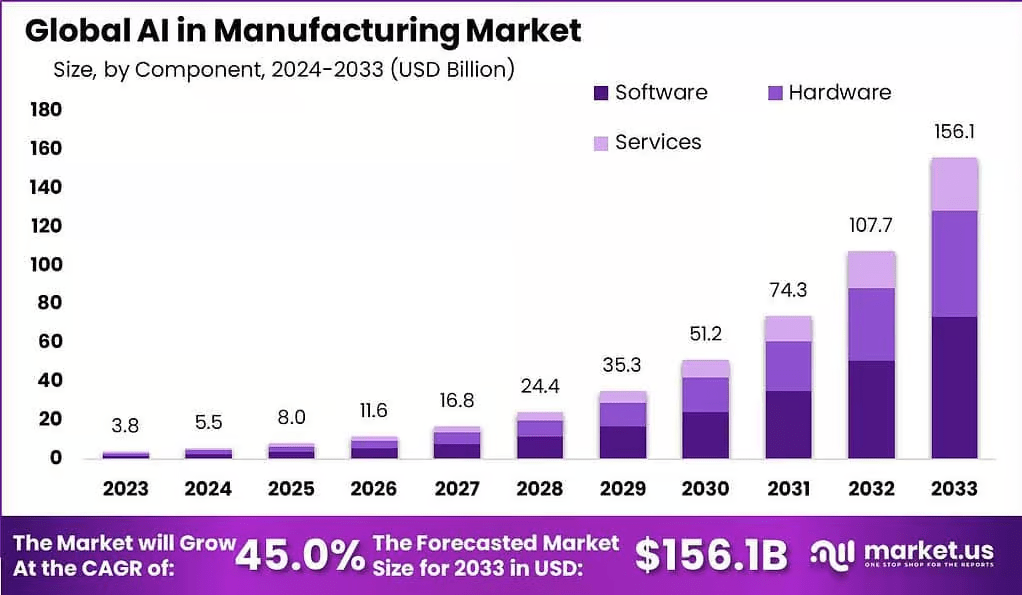Introduction
The AI in Manufacturing market is revolutionizing traditional production lines by integrating intelligent systems that optimize efficiency, quality, and decision-making across operations. Artificial intelligence is being embedded in every layer of the manufacturing process—from predictive maintenance and demand forecasting to quality control and supply chain optimization. As manufacturers face growing pressure to reduce costs, minimize downtime, and stay competitive in a digitally connected world, AI has emerged as a game-changer, driving the transition toward Industry 4.0 and enabling factories to become smarter, faster, and more adaptive.

Key Takeaways
AI in manufacturing is accelerating due to rising demand for automation, real-time analytics, and operational agility. Predictive maintenance, visual inspection, process optimization, and energy management are some of the leading use cases driving adoption. The integration of AI with IoT, digital twins, and robotics is creating intelligent manufacturing ecosystems capable of self-correction and continuous learning. North America and Europe lead in adoption due to early digital transformation initiatives, while Asia-Pacific is rapidly expanding with strong government backing and a growing industrial base. Key challenges include data quality, high implementation costs, and workforce reskilling.
Component Analysis
The core components of AI in manufacturing include machine learning platforms, computer vision systems, predictive analytics tools, natural language processing, and industrial IoT (IIoT) connectivity. Machine learning algorithms enable adaptive control systems and demand forecasting, while computer vision is used for real-time defect detection and product classification. Predictive analytics tools analyze machine data to preempt failures and schedule maintenance efficiently. NLP interfaces power human-machine collaboration on shop floors, and IIoT enables the seamless flow of data between equipment, sensors, and cloud-based AI engines, forming the backbone of intelligent production environments.
Service Analysis
AI services in manufacturing range from consulting and integration, custom model development, cloud-based AI solutions, and predictive maintenance services, to training and support for workforce adoption. Service providers assist in retrofitting legacy systems with AI capabilities, deploying digital twins, and developing tailored algorithms for quality control, inventory management, and energy optimization. Managed AI services allow manufacturers to access analytics dashboards, automated alerts, and performance insights without investing in in-house expertise. As companies prioritize ROI and scalability, AI-as-a-Service (AIaaS) offerings are growing, especially among small and medium-sized manufacturers.
Key Player Analysis
Key players in the AI in manufacturing market include Siemens, IBM, General Electric, Microsoft, Rockwell Automation, NVIDIA, and PTC. Siemens and GE lead in industrial AI integration with platforms that combine analytics, IoT, and automation. IBM’s Watson for Manufacturing offers real-time insights across the value chain, while Microsoft Azure supports scalable, AI-powered industrial solutions. NVIDIA is enabling AI model training and edge AI deployment through its GPUs, and PTC’s ThingWorx platform combines AI with AR and IIoT for smart factory applications. These players are shaping the market through strategic partnerships, acquisitions, and robust R&D investments
.Top Market Leaders
- IBM Corporation
- Microsoft Corporation
- Oracle Corporation
- Google LLC
- Siemens AG
- NVIDIA Corporation
- General Electric Company
- Intel Corporation
- Amazon Web Services, Inc.
- ABB Ltd.
- SAP SE
- Cisco Systems, Inc.
- Rockwell Automation, Inc.
- Other Key Players
Conclusion
AI in manufacturing is not just a trend but a strategic necessity for future-ready industries. As factories become increasingly digitized, AI will play a central role in improving productivity, reducing waste, and enabling data-driven innovation. The convergence of AI with robotics, IoT, and cloud computing is paving the way for autonomous and intelligent manufacturing ecosystems worldwide.
The macro analyst desk brings highly sought after financial news based on market analysis, insider news and company filings.
